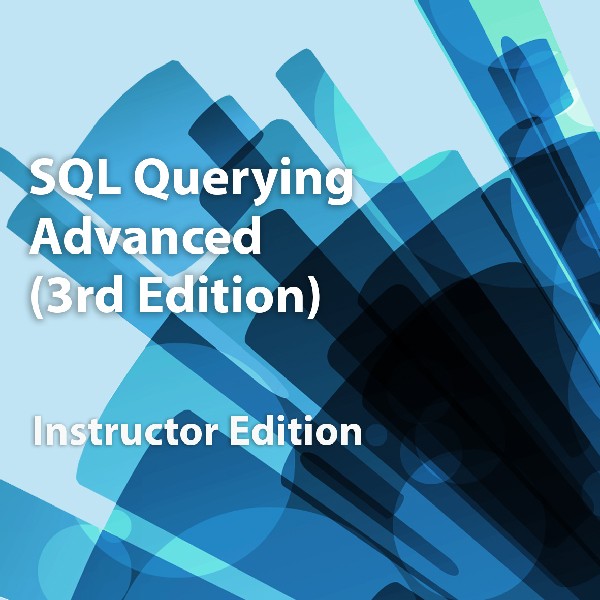
SQL Querying-Advanced (Third Edition), Instructor Edition
R 652.00
SQL Querying: Advanced (Third Edition)
Course Specifications
Course Number: ELK94–030_rev1.0
Course Length: 1 day
Course Description
In today's competitive environment, information is one of the most important factors in determining the success of an organization. If you are able to manage and retrieve information efficiently, you can streamline the organization's processes and give it a competitive edge. Some data analysis tasks may require that you query multiple tables simultaneously or create complex views of data.
In the course SQL Querying: Fundamentals (Third Edition), you learned the basics of SQL querying. In this course, you will build on this foundation, learning advanced querying techniques, such as writing nested queries and using views to simplify repetitive querying tasks. You will also learn how to perform common database administration tasks such as duplicating tables; modifying table structures; inserting, updating, or deleting data; and indexing tables to optimize query performance. You will also learn how to work with multiple tasks as a transaction.
Course Objective: In this course, you will construct advanced queries and apply them to data.
You will:
- Use nested queries to generate query output.
- Manipulate table data by inserting, modifying, and deleting data.
- Manipulate the structure of tables.
- Work with views to present data.
- Index data to improve querying efficiency.
- Manage database transactions.
Target Student: This course is intended for individuals who have basic SQL skills and who want to expand their skillset with more advanced tasks.
Prerequisites: To ensure your success in this course, you should have at least basic experience with SQL querying, including selecting data using conditions, working with functions, organizing data, and retrieving data from multiple tables. You can obtain this level of skills and knowledge by taking the following Logical Operations course:
- SQL Querying: Fundamentals (Third Edition)
Hardware Requirements
For this course, you will need one computer for each student and one for the instructor. Each computer will need the following minimum hardware configurations:
- Sufficient processor speed, RAM, and storage space for good system performance when running Microsoft® SQL Server® Express and Microsoft® SQL Server® Management Studio (SSMS).
- Mouse, keyboard, and monitor.
- High-speed, stable Internet connection.
- For the instructor's computer, a method to project and/or share the screen as needed for local and remote class participants.
Software Requirements
- Microsoft® Windows® 10 or 11.
- SQL Server 2022 Express. (When this course was written, the installation file for this free software was available for download from https://www.microsoft.com/en-us/sql-server/sql-server-downloads.)
- SQL Server Management Studio (SSMS) 20.2. (When this course was written, the installation file for this free software was available for download from https://learn.microsoft.com/en-us/sql/ssms/download-sql-server-management-studio-ssms?view=sql-server-ver16.)
Course Content
Lesson 1: Using Nested Queries
Lesson 2: Manipulating Table Data
Lesson 3: Manipulating the Table Structure
Lesson 4: Working with Views
Lesson 5: Indexing Data
Lesson 6: Managing Transactions
Appendix A: The Pub2 Database

.jpg)
.jpg)
.jpg)
.jpg)


.png)